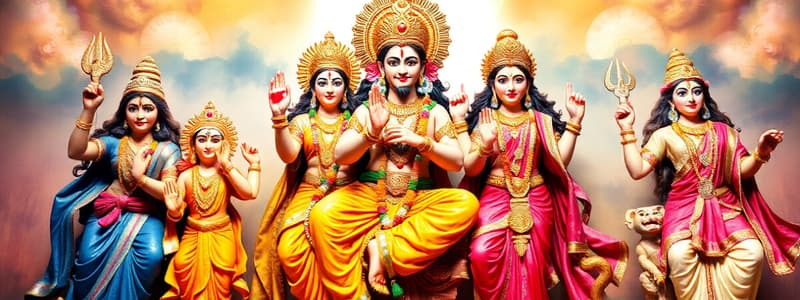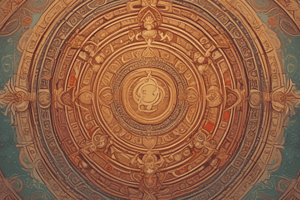Podcast
Questions and Answers
Which path of yoga involves devotion to one of the gods in Hinduism?
Which path of yoga involves devotion to one of the gods in Hinduism?
- Bhakti Yoga (correct)
- Jnana Yoga
- Karma Yoga
- Raja Yoga
Hinduism has a single known founder.
Hinduism has a single known founder.
False (B)
What does 'moksha' mean?
What does 'moksha' mean?
liberation from karma-samsara cycle
The belief in the cycle of birth, death, and rebirth in Hinduism is called __________.
The belief in the cycle of birth, death, and rebirth in Hinduism is called __________.
Which of these deities is considered the preserver of the universe?
Which of these deities is considered the preserver of the universe?
Match the following concepts with their meanings:
Match the following concepts with their meanings:
Karma refers to the cycle of life and death in Hinduism.
Karma refers to the cycle of life and death in Hinduism.
Name the three paths leading to moksha.
Name the three paths leading to moksha.
Which of the following deities was NOT worshiped in the Vedic religion?
Which of the following deities was NOT worshiped in the Vedic religion?
The Dravidians are considered the indigenous people of the Indian subcontinent.
The Dravidians are considered the indigenous people of the Indian subcontinent.
Who is recognized as the founder of Buddhism?
Who is recognized as the founder of Buddhism?
Buddhism teaches that all humans are subject to __________.
Buddhism teaches that all humans are subject to __________.
Match the following scriptures with their descriptions.
Match the following scriptures with their descriptions.
What is the title given to Siddhartha Gautama after attaining enlightenment?
What is the title given to Siddhartha Gautama after attaining enlightenment?
The worship of local deities is a notable aspect of Dravidian traditions.
The worship of local deities is a notable aspect of Dravidian traditions.
What does the term 'Middle Way' refer to in Buddhism?
What does the term 'Middle Way' refer to in Buddhism?
What is the primary concept associated with the Four Noble Truths?
What is the primary concept associated with the Four Noble Truths?
The Mahayana tradition of Buddhism teaches that individuals must join the homeless state of monks to attain Nirvana.
The Mahayana tradition of Buddhism teaches that individuals must join the homeless state of monks to attain Nirvana.
List the components of the Noble Eightfold Path.
List the components of the Noble Eightfold Path.
In Sikhism, the belief in one God is referred to as __________.
In Sikhism, the belief in one God is referred to as __________.
Match the following Buddhist traditions with their characteristics:
Match the following Buddhist traditions with their characteristics:
What must a monk abstain from according to the additional five precepts?
What must a monk abstain from according to the additional five precepts?
Guru Granth Sahib is a significant text in Sikhism containing the teachings of the Sikh Gurus.
Guru Granth Sahib is a significant text in Sikhism containing the teachings of the Sikh Gurus.
What is required to attain Mukti (Salvation) in Sikhism?
What is required to attain Mukti (Salvation) in Sikhism?
What is the purpose of meditation on God according to Sahaj belief?
What is the purpose of meditation on God according to Sahaj belief?
The Gurdwara functions solely as a place of worship without any community service.
The Gurdwara functions solely as a place of worship without any community service.
Which of the following is NOT one of the five constants in Confucianism?
Which of the following is NOT one of the five constants in Confucianism?
Confucianism emphasizes a detailed concept of God similar to traditional religions.
Confucianism emphasizes a detailed concept of God similar to traditional religions.
Who is the founding figure of Confucianism?
Who is the founding figure of Confucianism?
The Sikh scripture is known as the ________.
The Sikh scripture is known as the ________.
What is the ultimate goal in Confucianism?
What is the ultimate goal in Confucianism?
Which of the following is NOT one of the Ten Gurus in Sikhism?
Which of the following is NOT one of the Ten Gurus in Sikhism?
Confucianism defines Shu as ____, meaning 'do to others what you would have them do to you.'
Confucianism defines Shu as ____, meaning 'do to others what you would have them do to you.'
Confucianism emphasizes the importance of social harmony and relationships.
Confucianism emphasizes the importance of social harmony and relationships.
Match the concepts related to Ihsan with their descriptions:
Match the concepts related to Ihsan with their descriptions:
Which virtue in the Sizi emphasizes loyalty?
Which virtue in the Sizi emphasizes loyalty?
What is one of the main teachings of Confucianism regarding how to treat others?
What is one of the main teachings of Confucianism regarding how to treat others?
Rituals in Confucianism are considered unimportant for social order.
Rituals in Confucianism are considered unimportant for social order.
What does the term 'Yi' represent in Confucian ethics?
What does the term 'Yi' represent in Confucian ethics?
Flashcards
Vedic Religion
Vedic Religion
The foundation of Hinduism focused on rituals and worshipping deities like Indra and Agni.
Dravidians
Dravidians
Indigenous people of the Indian subcontinent, predating the Aryans.
Shruti Scriptures
Shruti Scriptures
Classified as 'heard', including Vedas, Upanishads, and Brahmanas, representing sacred knowledge.
Smriti Scriptures
Smriti Scriptures
Signup and view all the flashcards
Buddha
Buddha
Signup and view all the flashcards
Four Passing Sights
Four Passing Sights
Signup and view all the flashcards
Middle Way
Middle Way
Signup and view all the flashcards
Tripitaka
Tripitaka
Signup and view all the flashcards
Belief in many gods
Belief in many gods
Signup and view all the flashcards
Reincarnation
Reincarnation
Signup and view all the flashcards
Karma
Karma
Signup and view all the flashcards
Moksha
Moksha
Signup and view all the flashcards
The Trimurti
The Trimurti
Signup and view all the flashcards
Papa
Papa
Signup and view all the flashcards
Punya
Punya
Signup and view all the flashcards
Aryan
Aryan
Signup and view all the flashcards
Sangha
Sangha
Signup and view all the flashcards
Four Noble Truths
Four Noble Truths
Signup and view all the flashcards
Noble Eightfold Path
Noble Eightfold Path
Signup and view all the flashcards
Five Precepts
Five Precepts
Signup and view all the flashcards
Theravada Buddhism
Theravada Buddhism
Signup and view all the flashcards
Mahayana Buddhism
Mahayana Buddhism
Signup and view all the flashcards
Sikhism
Sikhism
Signup and view all the flashcards
Mukti (Salvation)
Mukti (Salvation)
Signup and view all the flashcards
The Five Constants
The Five Constants
Signup and view all the flashcards
Ren
Ren
Signup and view all the flashcards
Yi
Yi
Signup and view all the flashcards
Li
Li
Signup and view all the flashcards
Zhi
Zhi
Signup and view all the flashcards
Shu
Shu
Signup and view all the flashcards
Ultimate Goal of Confucianism
Ultimate Goal of Confucianism
Signup and view all the flashcards
Ihsan
Ihsan
Signup and view all the flashcards
Sahaj
Sahaj
Signup and view all the flashcards
Guru Granth Sahib
Guru Granth Sahib
Signup and view all the flashcards
Ten Gurus
Ten Gurus
Signup and view all the flashcards
Gurdwara
Gurdwara
Signup and view all the flashcards
Confucianism origin
Confucianism origin
Signup and view all the flashcards
Confucius
Confucius
Signup and view all the flashcards
Golden Rule in Confucianism
Golden Rule in Confucianism
Signup and view all the flashcards
Core beliefs of Confucianism
Core beliefs of Confucianism
Signup and view all the flashcards
Study Notes
Hinduism
- Belief in many gods
- Belief in reincarnation
- Belief in karma
- Belief in samsara
- Belief in moksha
- Originated from the Indian subcontinent
- No known founder
- Does not have a standard concept of God
- Important deities include: Varuna (God of rain), Mitra (God of sun), Vishnu (preserver of the universe), Indra (God of thunder), Vayu (God of wind), Parjanya (God of rain cloud), Maruts (troop of storm gods), and Rudra (God of violence)
- Female divinities include: Surya (sun goddess), Dishana (fertility goddess), and Sarasvati (goddess of knowledge)
- The Trimurti are Brahma (creator), Vishnu (preserver), and Shiva (destroyer)
- Brahma is the least worshipped of the three
- Vishnu is the preserver of the universe, known for love and benevolence.
Jainism
- (No information on Jainism is present in the provided text)
Buddhism
- Founder: Siddhartha Gautama (later known as Buddha)
- Title: Enlightened one
- Four passing sights: old age, sickness, death, and an ascetic monk
- First sermon: Setting in motion the wheel of truth
- Avoid two extremes: self-indulgence and self-mortification
- Enlightenment achieved through the Middle Way
- Middle Way leads to Nirvana
- Non-theistic religion
- Siddhartha Gautama was an enlightened teacher, not a god
- Scripture (Tripitaka) consists of the Vinaya Pitaka (rules of the Buddhist order), Sutta Pitaka, and Abhidhamma Pitaka (metaphysical instruction)
- Doctrines & Creeds: Triratna – Buddha (the teacher and goal to be attained), Dharma (teachings and path to be realized), and Sangha (faithful community of practitioners)
- Four Noble Truths: 1) Suffering exists; 2) Suffering arises from attachment; 3) Suffering ceases; 4) The path leading to the cessation of suffering exists.
- Noble Eightfold Path: Right understanding, thought, speech, action, livelihood, effort, mindfulness, and concentration
- The Ten Precepts
- Denominations: Theravada (small vehicle), Mahayana (great vehicle), and Tibetan/Diamond vehicle
Sikhism
- Belief in one God (Sat Nam)
- Belief in ten gurus
- Belief in the Guru Granth Sahib
- Belief in the teachings of the Sikh gurus
- Theology: Belief in one God, Sat Nam, which is unborn, uncreated, and created all things
- Salvation (Mukti): Achieved by detaching from worldly life and devotion to God
- Sahaj: State of mental and spiritual balance, detachment from material possessions and desires, participation in the world with compassion
- Scripture: Guru Granth Sahib, a compilation of hymns from the first five gurus and Hindu and Muslim saints
- Ten Gurus: Nanak, Angad, Amar Das, Ram Das, Arjan Dev, Har Gobind, Har Rai, Har Kishan, Tegh Bahadur, Gobind Singh
- Gurdwara: Houses of worship for Sikhs, teaching and practice of Sikh spirituality, sanctuary for women, and Sikh service to humanity
Confucianism
- Originated in China around the 6th century BCE
- Founding figure: Confucius (Kong Fuzi)
- Sacred texts: Analects, Five Classics, and Four Books
- Core beliefs: Morality, social harmony, and importance of relationships (especially filial piety)
- Main teachings: Positive and Negative Golden Rules (Treat others as you would want to be treated)
- Doctrines: Moral code for social and political behaviour, focused on cultivation of humanness rather than birth
- Goals: Cultivate humanness, proper behaviour in five relationships
- Five Constants: Ren (humaneness), Yi (justice), Li (proper rite), Zhi (knowledge), and Xin (integrity)
- Sizi: Loyalty, filial piety, propriety, and righteousness
- Concept of God: Confucianism is a philosophy, not a religion, and doesn't emphasize a concept of God focusing instead on ethical principles
- Rituals: Maintaining social order and respecting ancestors are key
- Ultimate goal: Create a harmonious society
- Ethics of reciprocity: Empathy with others, perceiving neighbours, understanding relationships between groups
Islam
- (No specific details on Islam are provided in the text)
Studying That Suits You
Use AI to generate personalized quizzes and flashcards to suit your learning preferences.




